Dark Horse Blu-ray Movie
HomeDark Horse Blu-ray Movie 
Virgil Films & Entertainment | 2011 | 86 min | Not rated | Nov 13, 2012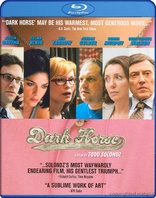
Movie rating
6.2 | / 10 |
Blu-ray rating
| Users | 0.0 | |
| Reviewer | 4.0 | |
| Overall | 4.0 |
Overview
Dark Horse (2011)
Romance blooms between two people in arrested development: an avid toy collector who is the dark horse of her family and a depressed woman on the rebound.
Starring: Jordan Gelber, Selma Blair, Christopher Walken, Donna Murphy, Justin BarthaDirector: Todd Solondz
| Dark humor | Uncertain |
| Drama | Uncertain |
| Comedy | Uncertain |
Specifications
Video
Video codec: MPEG-4 AVC
Video resolution: 1080p
Aspect ratio: 1.85:1
Original aspect ratio: 1.85:1
Audio
English: DTS-HD Master Audio 5.1
Subtitles
None
Discs
25GB Blu-ray Disc
Single disc (1 BD)
Playback
Region A (C untested)
Review
Rating summary
| Movie | 4.0 | |
| Video | 4.5 | |
| Audio | 3.0 | |
| Extras | 0.0 | |
| Overall | 4.0 |
Dark Horse Blu-ray Movie Review
Losing Proposition
Reviewed by Michael Reuben November 15, 2012A memorable exchange in Todd Solondz's 1998 tour de force, Happiness, occurs between Helen, an icy, self-absorbed beauty and her mousy, emotionally needy sister with the ironic name of Joy. "I'm not laughing at you", says Helen, "I'm laughing with you." To which Joy faintly protests: "But I'm not laughing!" The narrow space where the sisters don't connect is where Solondz always seems to be aiming: a point where it's possible to laugh, but you're not sure it's the right thing to do. The danger of such a pursuit, especially for a filmmaker of Solondz's icy precision, is that it doesn't allow an audience the relief that uninhibited laughter provides. Snorts of derision aren't a lot of fun, and pinning up self-deluded, hopeless lives to be studied like butterflies in a collection isn't most viewers' idea of entertainment, which is why Solondz remains confined to the arthouse. Even Happiness, which got laughs with shock effects, grotesquerie and violence (mostly imaginary), failed to attract a wider audience. Dark Horse is a more modestly scaled effort, and it doesn't have much of a plot. But it's a fascinating film, because it's the first time that Solondz has applied his considerable talent for depicting broken lives without a hint of mockery. The protagonist of Dark Horse, Abe Westheimer, is pitiful, self-destructive, self-deluding and childish in the extreme. He's also a deeply melancholy man who has seen life pass him by and knows in his bones that he will never catch up. Branded a "dark horse" from an early age, he keeps trying to compete, even as he feels that the race is already over. Jordan Gelber, until now a supporting player in movies and TV, gives an award-worthy performance by making this unappealing character a fully rounded human being—and how often does one reach for that phrase in describing someone in a film by Todd Solondz?
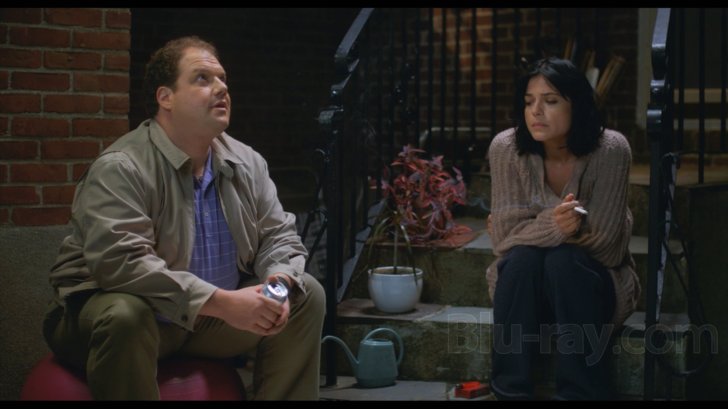
Dark Horse opens at a lively wedding, at which two people are sitting apart: Abe (Gelber) and Miranda (Selma Blair). At first glance, the scene appears obvious and familiar. A pushy, overweight jerk is trying to pick up an attractive woman, and she's sitting there uncomfortably calculating how best to slip away. While that description is accurate, the rest of Dark Horse demonstrates how much more is happening beneath and behind the scene. (The end credits list Blair's character as "Miranda (formerly 'Vi')", which suggests that she's an older version of the character that Blair played in 2001's Storytelling.) Abe does ultimately succeed in getting Miranda's number, and they do end up on a date of sorts. Behind the perpetually stricken look on Miranda's face lies an array of issues that, in a hallmark of Solondz's world, are specific and bizarre. The marketing hook for Dark Horse suggests that "love" develops between Miranda and Abe, but while something does develop, it's far too strange and distinctive to be called love. It's something, though, which is more than Abe appears to have managed previously with anyone outside his family. Abe is hardly ready for anything as demanding as love. While we get only glimpses into Miranda's life, Dark Horse provides an extensive overview of Abe's, and it's a tour of dead ends. Abe works for his father, Jackie (Christopher Walken, pent-up and subdued), in property management, where he does as little as possible, despite constant protests that he's working hard. Instead of preparing the spreadsheets for which his father keeps asking, Abe trolls eBay for collectibles, of which his room at his parents' home is a veritable museum. (He's also a regular at Toys 'R' Us, although the logo has been digitally obscured, presumably to save licensing fees.) When Abe enters the house, he slinks past Jackie and his mom, Phyllis (Mia Farrow), barely acknowledging her greeting, so that he can hide in his room and imagine an alternate life with someone like Miranda. Put him with strangers, and Abe does a paper-thin imitation of a successful businessman. No one is fooled. In a kind of sad comment on their family life, Abe's parents are always watching a TV show that sounds something like Seinfeld, because it features the voices of George Costanza and his parents. The production company couldn't afford to license Seinfeld, but it was able to hire Jason Alexander, Estelle Harris and Jerry Stiller to do voiceovers for Seinfeld-like dialogue. If only the Westheimers were even remotely like the Costanzas! A constant reminder of Abe's failure in life is his brother, Richard (Justin Bartha), a doctor in California. As mothers tend to do, Phyllis keeps trying to get them back in touch, but Abe will have none of it. As the film progresses, Richard begins to intrude into the dreams and waking fantasies that gradually overwhelm Abe's thoughts. At first, they are dominated by Marie (a sly Donna Murphy), who, in Abe's mind, morphs from being a frazzled co-worker offering him assistance in his father's office to a sloe-eyed cougar with a fast car and even faster hands. Eventually, though, Abe's fantasies spin as wildly out of control as his real life, especially after Miranda introduces him to her ex-boyfriend, a frothy extrovert named Mahmoud (Aasif Mandvi, fitting right into the Solondz universe). When Abe shows Miranda his parents' home, he points to the door frame where his father marked off his and his brother's heights as they grew. The markings have now been covered with wallpaper. The image recurs toward the end of the film and marks a final turn leading to the story's conclusion, which my colleague Brian Orndorf found to be a "switcheroo" when Dark Horse was in theaters. It's certainly a provocative ending, following upon developments that would be shocking in almost anything except a Todd Solondz film, but I'm not sure the final sequence should be taken too seriously. Like the sled in Citizen Kane, it's a piece of the puzzle, but not the whole picture. More central to Abe's story is a speech he delivers—nominally to his mother, who happens to be in the room, but really to the universe in general—about all the opportunities that have passed him by. In an earlier Todd Solondz film, this would have been a cringe-inducing display of narcissism by a lazy jackass, worthy only of ridicule. But in this one, and in the hands of Jordan Gelber, it becomes a tragic lament by someone who knows he's blown it, can't figure out why and, under all that bluster, hates himself for not trying harder. People like that exist, more than we care to think about, and Solondz understands their pain. This is one of their stories, and the film's ending is meant as a reminder that it's not a rarity.
Dark Horse Blu-ray Movie, Video Quality 
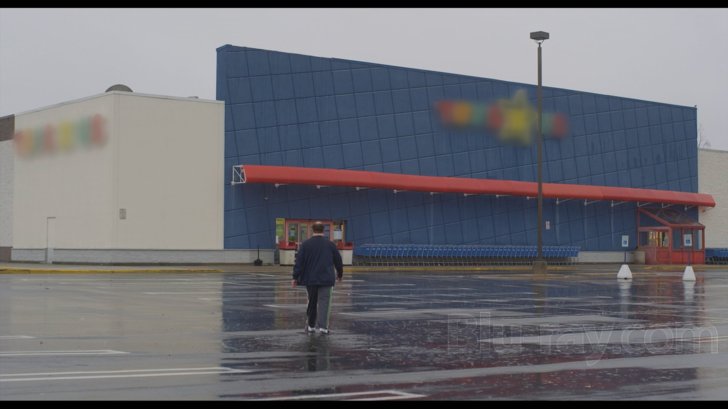
Dark Horse bears all the marks of digital photography, and after this review was posted, I was contacted by someone who worked on the film, who confirmed that the film was shot with the Red system. The cinematographer was the talented Andrij Parekh, whose effective intermingling of film and digital was essential to the aesthetic of the haunting Blue Valentine. As he so often does, Solondz has situated his dark tale in a superficially cheerful suburban world, and the image on Virgil Films's 1080p, AVC-encoded Blu-ray aptly conveys the brightly lit surroundings that merely serve to emphasize the black hole of Abe's life. Noise is wholly absent, blacks are deep and solid, and detail is so good that toy and memorabilia enthusiasts may want to pause the disc during scenes in Abe's bedroom to admire his collections. (The life-size gremlin in his office is also impressive.) Bright primary colors dominate Abe's favorite places, including Toys "R" Us, er, the toy store, but even his father's office looks brighter and more inviting than your typical dingy bean counter's affair. Abe drives a bright yellow Hummer, because, apparently, that's just one of the many toys that sustains his interest in clinging to the edge of the abyss. A BD-25 is more than sufficient to accommodate this 86-minute film with no extras.
Dark Horse Blu-ray Movie, Audio Quality 
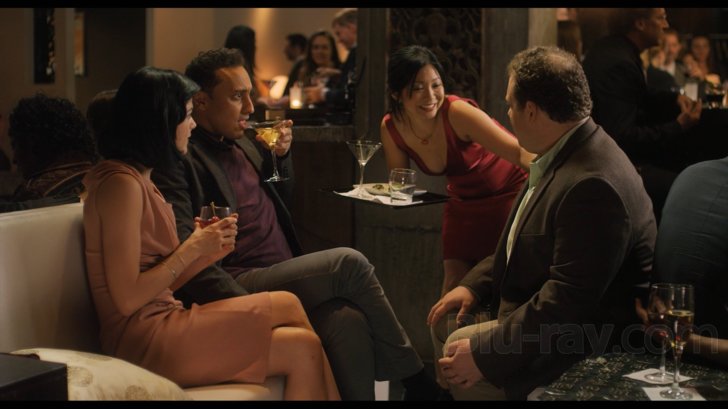
The film's DTS-HD MA 5.1 track is serviceable and front-oriented with clear dialogue and a general sense of ambiance, but no real use of discrete effects in the rear channels. The film has no separate score but features a distinctive soundtrack anchored by the recurrent track "Who You Wanna Be", written and performed by Michael Kisur.
Dark Horse Blu-ray Movie, Special Features and Extras 
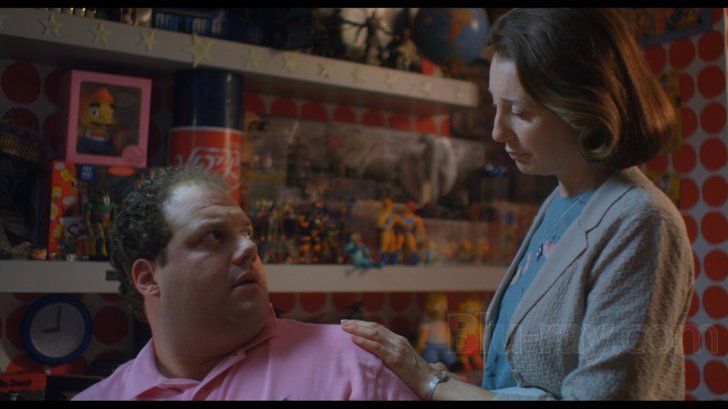
The disc contains no extras.
Dark Horse Blu-ray Movie, Overall Score and Recommendation 
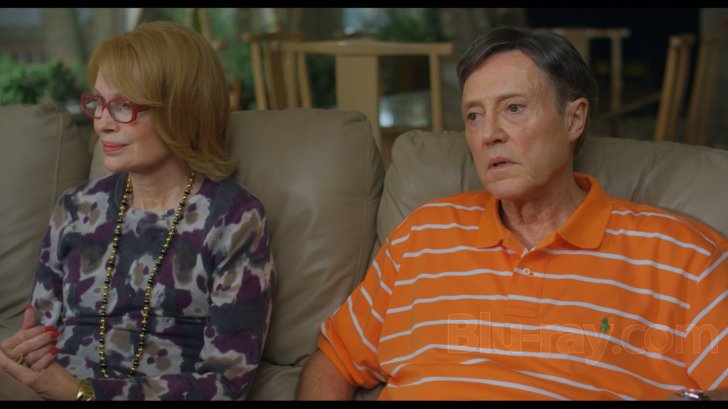
There has always been a Diane Arbus quality to Solondz's work, and the screenshots accompanying this review should confirm its continuation in Dark Horse. The hair and make-up for Christopher Walken and Mia Farrow, and the hollow-eyed affect of Selma Blair (to take the most obvious examples) are visual grotesques that would have fit easily into an Arbus portfolio. In stark contrast, though, is the visual treatment of Jordan Gelber's Abe, who, even at his most despairing, appears animated and visually vital, perhaps more so than any other character in the film. The thematic tension between the visual message and the narrative line is yet one more sign that Solondz is entering a new phase of his development as a filmmaker. Not recommended as a blind buy, but essential viewing for anyone interested in the progress of one of American cinema's most original talents.
Similar titles
Similar titles you might also like

Girls: The Complete First Season
2012

Le Week-End
2013

The Boys in the Band
1970

Tiny Furniture
2010

Frances Ha
2012

Mistress America
2015

The King of Staten Island
2020

Girls Trip
2017

Rough Night
The Rougher Morning Edition
2017

Don't Think Twice
2016

Educating Rita
1983

Diner
1982

Fandango
Warner Archive Collection
1985

Larry Crowne
2011

The Dilemma
2011

Solitary Man
2009

The Beach Bum
2019

Dirty Grandpa
2016

Laggies
2014

Come Back, Little Sheba
1952